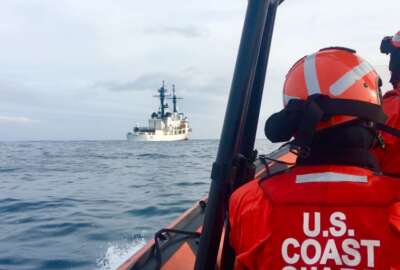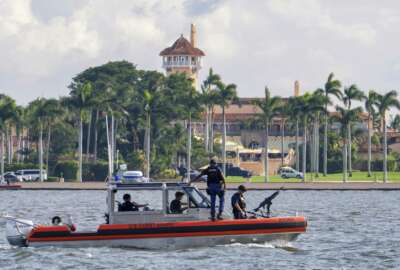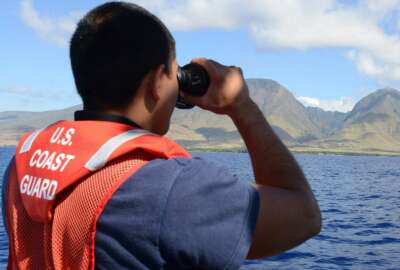
No budget maneuvers this time, as Coast Guard military is set to miss Jan. 15 paycheck
The Trump administration maneuvered unobligated funding and found a way to pay Coast Guard military members back in December. But the service doesn't have the funds...
As civilian employees impacted by the partial government shutdown are set to miss their first paychecks of 2019, uniformed service members working through the lapse in the appropriations will soon see a similar fate.
Without an appropriations bill or short-term spending deal, the Coast Guard doesn’t have funding to cover the next paychecks for some 41,000 military members, a senior administration official told Federal News Network on Thursday.
Those checks are due Jan. 15.
But earlier during the government shutdown, the Coast Guard had found a way to cover military members’ last paycheck of 2018 — after further legal analysis from the Trump administration.
Related Stories

With shutdown to stretch past a week, uniformed Coast Guard will miss next paycheck
Hours before the Dec. 28 deadline the Coast Guard said it conducted “extensive research and legal analysis” with the Office of Management and Budget and DHS. That analysis showed the service could pay its military workforce in full and on time by Dec. 31.
To come to this decision, the administration first needed to determine it had the legal obligation to pay Coast Guard military members for the duration of the pay period, which ran from Dec. 16-31. Second, it needed to find the funds to pay previously-incurred obligations.
Federal statute describes slightly different procedures for paying civilian and military personnel. But for the military, services incur the obligation to pay their members on the first day of every month, for one month at a time.
Because the partial government shutdown began after the first month on Dec. 22, the Coast Guard had already incurred the obligation to pay its military workforce for all of December — even though it technically lacked the appropriations it would otherwise use to pay service members.
“When we went back and looked, we realized that the statute was written so that the obligation, the legal duty to pay, began on Dec. 1 and would cover the entire month,” the official said. “That’s why we were able to incur that obligation.”
Once the administration had determined that it had the legal authority to incur expenses and pay the Coast Guard military for all of December, OMB worked with the service to find unobligated funding in the now-expired continuing resolution, the official said.
Those funds covered military Coast Guard pay for members’ last paycheck of 2018. But the service doesn’t have enough money to cover the first paycheck of 2019.
“The January obligation has arisen for the month, when [the Coast Guard] has to pay it, [it] will not have any money to make that payment,” the official said.
The 11th hour decision to pay the Coast Guard military in December is part of an ongoing effort by the administration to uncover longstanding exceptions to the Antideficiency Act, which essentially bars agencies from spending money they don’t have.
To mitigate the impact of the lapse in appropriations, the administration is continuing to evolve and find new interpretations of this law, the official said.
“We spent a lot of time on it with the agency’s counsel, with OMB lawyers [and] with Department of Justice lawyers to make sure that with our marching orders to make [the shutdown] as painless as possible, we are being consistent with the law.”
The IRS’ decision to pay tax refunds and the Agriculture Department’s decision to issue supplemental nutrition benefits early are examples. More decisions may come the longer shutdown continues, the administration official said.
Relief for Coast Guard military?
Meanwhile, the Coast Guard is providing more resources and advice for its workforce to mitigate the financial impacts of the shutdown.
The Coast Guard has provided two letters for its civilian and military workforce to prove the shutdown’s impact on their pay and financial obligations. One comes from Angela Bailey, the Department of Homeland Security’s chief human capital officer.
The second is tailored to Coast Guard military members.
“This lapse in appropriations is beyond our members’ control and is expected to be a temporary situation,” Rear Adm. Matthew Sibley, the Coast Guard’s acting assistant commandant for human resources, said in one of the letters, dated Dec. 27. “We appreciate your organization’s understanding and flexibility in working with Coast Guard members who request forbearance on their obligations until this situation is resolved.”
Some members of Congress have also sought a solution to pay the Coast Guard.
Sen. John Thune (R-S.D.) has introduced the Pay Our Coast Guard Act. The bill would ensure Coast Guard military members, civilian employees and contractors get paid for any period of time where stop-gap or full-year appropriations aren’t in effect.
Copyright © 2025 Federal News Network. All rights reserved. This website is not intended for users located within the European Economic Area.
Nicole Ogrysko is a reporter for Federal News Network focusing on the federal workforce and federal pay and benefits.
Follow @nogryskoWFED




